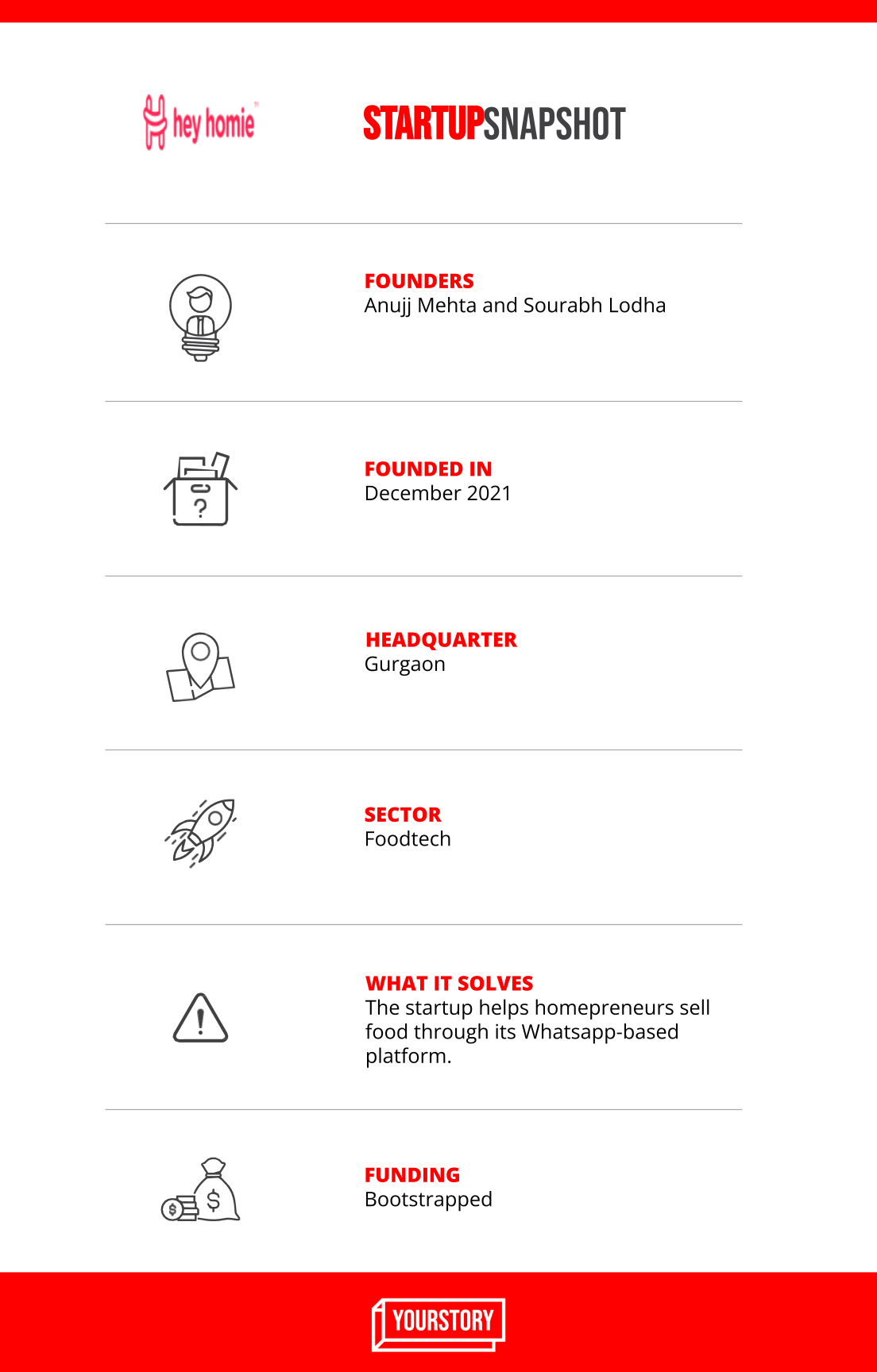While studying 50-odd startups catering to home chefs, entrepreneur Anujj Mehta learnt that these startups are unable to scale up as one of their biggest competitors in WhatsApp.
In an interaction with YourStory, he says, “What would stop you from making a group within your condominium and ask the chefs to start selling their food in the group? We understood that our presence within WhatsApp is important because if we try to get a customer to download an app to order home-cooked food, they will not do it.”
In December 2021, Anujj, along with Sourabh Lodha, launched — a WhatsApp-first conversational platform — to empower homepreneurs, especially home chefs, to have their own digital identity through a credible WhatsApp store to sell their products and services from the comfort of their homes.
Hey Homie is available in over 90 condominiums in Delhi-NCR and has onboarded nearly 120,000 households. At present, close to 3,000 home chefs sell their products through the startup’s platform, which receives an average of 68 orders per day per condominium, with an average order value of Rs 106.
How it began
Hey Homie has had several names since its inception in August 2016. Five years ago, Anujj had started the company as a WhatsApp group called Khao Gali. The pilot project soon became popular as ‘H for hungry’.
“Initially, home chefs shared their meals on the WhatsApp group, and people would confirm their order and go pick up the meal. When they did so, they ended up meeting their long lost friends or finding new friends,” Anujj says.
He shares, “We have stories where people found their soulmates and ended up getting married. We even have stories of people finding jobs through connections made through Hey Homie. This is the impact of buying within a community.”
Soon, the Khao Gali initiative began to take the shape of a platform offering a range of cuisines, including Tibetan, Nepalese, Marwari, Goan, Chettinad, and Maharashtrian, with a special focus on hygiene.

Moreover, the COVID-19 pandemic reiterated the demand for home-cooked food for its healthy, safe, and hygienic quotients.
In the past few years, the startup claims it has seen manifold growth, where it has increased its headcount of home chefs from 40 to 3,000 now.
“We are proud of the fact that we were able to make thousands of women financially independent. They contribute to the household expenses, they can pay their child’s tuition, and some of them also bought their first car,” he says.
How it works
Home chefs on the Hey Homie platform are divided into three categories — Hobby chefs, who do 1-2 meals a month; Intermediate chefs, who do 1-2 meals a week; and Professional home chefs, who operate an all-day kitchen.
The startup offers a ‘pay-as-you-go’ model for the first two tiers of chefs, i.e., they pay a commission to Hey Homie only when they have made a sale through the platform.
However, professional home chefs either pay 5 percent of the sale price or a monthly revenue of Rs 2,000, or whichever is higher.
“We aim to have the chefs focus only on what they’re doing. We take care of everything else — from lead generation to customer acquisition to delivery. Moreover, payments on our platform are credited real-time, so we don’t hold the payment for a week like other platforms, making it a financially viable option,” explains Anujj.
Hey Homie offers a 30-day free trial period to its chefs, which can be extended up to 60 days.
The WhatsApp-based model is easier to use for homepreneurs who are not tech-savvy and can use the chat feature to upload pictures of documents or type out information.
Other than home-cooked meals, the startup also operates a marketplace, where homepreneurs can sell semi-perishable items, including pickles, chutneys, home-made beverages, and groceries. According to Anujj, commercial shops cannot sign up for the marketplace.
Onboarding foodies
Hey Homie customers, referred to as “foodies”, can order food using the WhatsApp-based platform, which features multiple homepreneurs in the same cart.
Once a customer signs up on the platform, they are required to make a ‘foodie profile’, where they can mention their preferences and any allergies or health problems they might have.
It also allows users to make multiple profiles for their family members.
“For instance, if my father is diabetic, and I mention it on his profile, the system will be able to predict my appropriate food choices,” explains Anujj.
Looking ahead
Over the next three years, Hey Homie wants to grow as a healthy food brand, primarily focusing on regional foods.
The bootstrapped-startup aims to expand its footprints in cities like Mumbai, Bengaluru, Chandigarh, and Jaipur before it moves to Tier-II cities next year.
“Right now, we want to empower those cities where the culture of staying in condominiums is high because that gives us significant growth,” explains Anujj.
In a few months, the startup will launch a Junior Home Chefs section, where children between 10 and 18 years can create their shops on the Hey Homie platform under their parents’ guidance.
Startups like Comfort Curries, HomeChef Maagic, Buy Home Made and Home Foodi have similar business models where they sell homemade food.
Edited by Suman Singh


